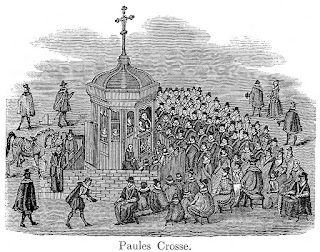So I'll be on at my usual time, around 6:50 a.m. Central/7:50 a.m. Eastern, to talk with Anna Mitchell or Matt Swaim about Bishops Thomas Watson (of Lincoln) and Edmund Bonner (of London). Please listen live here or find the podcast later here.
Father Bowden describes Bishop Thomas Watson as "A Peacemaker" on p. 307, but before his final acts of repentance during the reign of Elizabeth I, he contributed greatly to the divisions in the Church. He was a colleague of Bishop Saint John Fisher at Cambridge University, serving as Master of St. John's College, founded by Lady Margaret Beaufort, Henry VIII's grandmother. Unlike his superior, however, he took the Oath of Supremacy, but Bowden notes that he "maintained in all other points the Catholic Faith." Without unity with the universal Catholic Church and the Vicar of Christ, that would be difficult to do, I think. He upheld certain Catholic teachings, but not all.
During the reign of Edward VI he was imprisoned for "preaching in its defense" but was freed from prison during the reign of Mary I and asked by the Queen to preach at St. Paul's Cross outside St. Paul's Cathedral in London and promoted to Dean of Durham and then Bishop of Lincoln. Under Elizabeth I, he was imprisoned for "contempt and contumacy" because this time, he refused the Oath of Supremacy. Bowden provides the detail that he wrote to Lord Cecil on October 6, 1578 that he was both blind and lame. He was confined in Wisbech Castle during the time of the "Wisbech Stirs", when about 32 or 33 Catholic priests, Jesuit and secular, were detained there and argued about keeping Fast Days and other spiritual/penitential matters. Bowden describes him as trying to keep the peace.
He died on September 27, 1584, "having proved by twenty years of bonds his repentance for his early fall." The Bible verse is 1 Corinthians 1:10: "Now I beseech you, brethren, by the name of our Lord Jesus Christ, that you all speak the same thing, and that there be no schisms among you; but that you be perfect in the same mind, and in the same judgment."
Bishop Bonner of London is a more controversial figure, one of John Foxe's great villains for his questioning of suspected heretics during the reign of Mary I, but he's also controversial--and perhaps even more remarkable--for his stalwart support of Henry VIII's "Great Matter". Bowden titles his memento "Faithful in the End" (p. 285)
Bonner was a chaplain to Henry VIII and a member of Thomas Cardinal Wolsey's staff, and was zealous in promoting the king's Great Matter of the the divorce (annulment) and remarriage. Bowden includes the detail that Bonner "behaved, as he tells us himself, insolently to the pope." Rewarded for his service to the king, he was consecrated the Bishop of London in 1540 but of course was never confirmed by Papal Decree.
The Catholic Encyclopedia provides some additional details about his efforts in that diocese:
He opposed the "Visitors" appointed by the Council, and was committed to prison for so doing Though not long a prisoner, after two years of unsatisfactory struggle he came again into conflict with the Protector owing to his omission to enforce the use of the new Prayer Book. When ordered to preach at St. Paul's Cross he did so, but with such significant omissions in the matter which had been prescribed touching the king's authority, that he was finally deprived of his see and sent as a prisoner to the Marshalsea. . . .
for the first time! and finally freed upon the accession of Mary I, whereupon Bonner was canonically reinstated as Bishop of London.
He assisted Reginald Cardinal Pole with the program of re-establishing the infrastructure and teachings of the Catholic Church in England, writing sermons to be read throughout his diocese and a catechism. Regarding his efforts to investigate heretics, Bowden notes that Bonner always wanted to "reconcile them to the Church before handing them over to the civil authorities."
When Mary died and Elizabeth came to the throne, Bonner again proved himself loyal to the Church, refusing to stop the celebration of Mass and the praying of the Divine Office at St. Paul's. Bowden quotes him as responding to those demands, "I possess three things--soul, body, and property. Of the two last you can dispose at your pleasure." He was imprisoned in the Marshalsea and died there on September 5, 1538. Bowden cites Psalm 50:14: "Restore unto me the joy of thy salvation, and strengthen me with a perfect spirit." He includes another memory of Bishop Bonner on page 319 with title "Poverty Preferred" and the verse from James 2:5.
By including these two fallen and repentant Confessors in his Mementoes of the English Martyrs and Confessors, Father Bowden is clearly offering examples of how we, like them, can repent of our sins, be reconciled to God and the Church, and begin again through God's Grace and Mercy.
By including these two fallen and repentant Confessors in his Mementoes of the English Martyrs and Confessors, Father Bowden is clearly offering examples of how we, like them, can repent of our sins, be reconciled to God and the Church, and begin again through God's Grace and Mercy.
May they rest in peace.
Image Credit (Public Domain): Open air preaching at St. Paul's Cross.

No comments:
Post a Comment